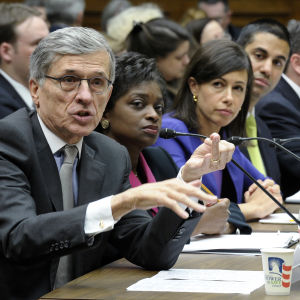Federal Communications Commission Chairman Tom Wheeler warned Congress Thursday if Republicans move to take away the agency’s power to regulate broadband rates, they’ll be “gutting” the FCC’s landmark net neutrality rules passed last year.
“If the issue is — does the FCC have rate regulation, versus can the FCC deforbear, then all of the sudden you’re gutting the Open Internet Order,” Wheeler told a Senate Appropriations subcommittee Tuesday. “You’re gutting the FCC’s ability to deal with other issues on an ex post basis, as opposed to ex ante, because at the heart of everything is rates.”
Republicans on the Financial Services and General Government Subcommittee pressed the FCC chief on an exchange he had with subcommittee Chairman John Boozman during a hearing last year, when Wheeler said if Congress wanted to pass legislation preventing the FCC from undoing the forbearance from rate regulation it set down in the 2015 Open Internet Order, he had “no difficulty” with it.
Last November House Republicans tried to slip a rider into a must-pass appropriations bill blocking the FCC from using its budget “to regulate, directly or indirectly, the prices, other fees, or data caps and allowances” for broadband, citing Wheeler’s own remarks as justification. Wheeler and Democrats lobbied hard to remove the rider, forcing Republicans to eventually concede when the White House said President Obama would refuse to sign the bill unless the net neutrality and other “ideological riders” were removed.
Republicans on a House Energy and Commerce subcommittee advanced a similar bill last month, when in a letter to the committee Wheeler explained Republicans expanded the original context of his comment into a broadly worded bill that could be interpreted to block the FCC from enforcing net neutrality.
“Paid prioritization is a rate issue,” Wheeler told senators Tuesday. “Throttling is a rate issue. Blocking is a rate issue. Interconnection is a rate issue.”
Wheeler cited other examples including language in the agency approved AT&T and DirecTV merger preventing AT&T from discriminating against non-DirecTV video traffic and the FCC’s inquiry into zero-rating programs like T-Mobile’s Binge On as rate issues the agency must have the power to review.
“We can find legislation that says, ‘no you may not deforbear,'” Wheeler continued, referencing the FCC’s decision not to apply Title II authority the agency uses to regulate telephone rates to broadband under the Open Internet Order, which reclassified Internet service under the same common carrier designation as telephone service.
“But that is different from the broader rate issue this seems to have morphed into,” he said.
Republican FCC Commissioner Ajit Pai, testifying alongside Wheeler, accused the FCC and the White House of changing course on rate regulation, and dismissed the notion legislation proposed by Congress does anything other than “codify” sentiments both expressed before and after the rulemaking.
“The president has said he doesn’t want the FCC regulating broadband Internet access rates, the chairman has said he doesn’t want the FCC regulating ex ante broadband Internet access rates,” Pai said. “It’s unfortunate … that while making the promise for the cameras — nonetheless behind the scenes, apparently according to you and others — the FCC has not been willing to work with you” on rate regulation.
Pai said that while the agency has pledged not to set rates upfront, declaring a rate unreasonable after the fact only counts as post-rate regulation one time — after that, it has the same affect as ex ante regulation.
“That’s part of the reason why it’s important for Congress to speak with a unified voice here to make sure that whatever the demerits of Title II — and there are plenty — nonetheless we should all be able to agree with what the president said,” Pai continued, “which is that the FCC should not be in this business.”

